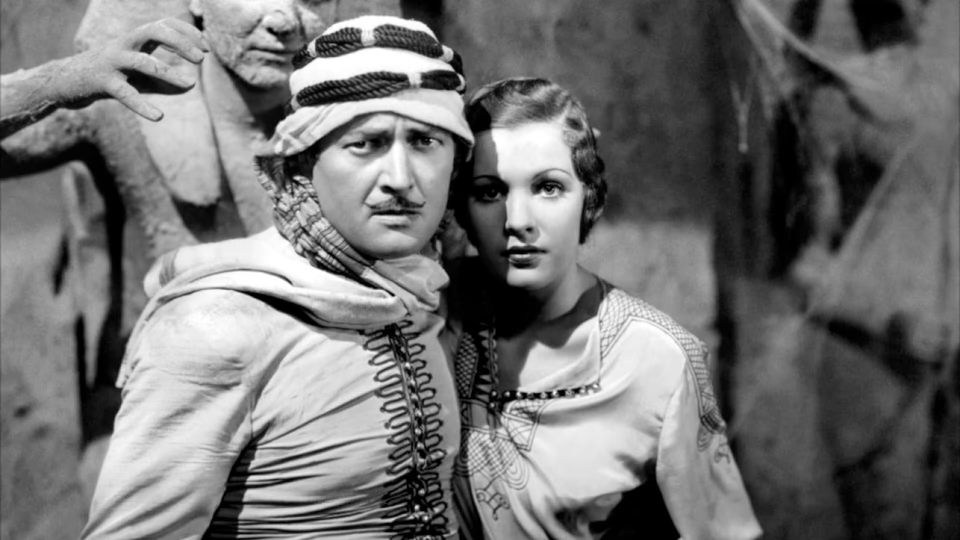Chandu the Magician

As the titular Chandu, Edmund Lowe is so miscast it borders on comedic.
The Chandu character began life as a popular radio series. Frank Chandler is an American ex-Army captain who adopts the name Chandu and masters the secrets of Yogi magic. This gives him the ability to mesmerize, astral project, and even teleport.
The film sees Chandu battle the megalomaniacal Roxor, played by third-billed Bela Lugosi, who kidnaps Chandu’s brother-in-law Robert because, as Chandu conveniently explains via voice-over-narration, “For years my brother-in-law has worked to perfect a death ray, capable of destroying whole cities.”
Roxor wants to use the death ray in typical super-villain fashion to conquer the world. Second-billed Irene Ware plays Chandu’s Egyptian princess love interest. She’s less a damsel in distress and more an afterthought, shoehorned into the story because of her character’s presence in the radio series.
Fox’s desire to capitalize on the radio series led them to put money and talent into the production. Roxor’s island temple set looks great, as do the Egyptian exteriors, both highlighted by James Wong Howe’s photography.
But other indoor sets look threadbare and cheap. Surprising, as co-director William Cameron Menzies literally invented the job of production designer. But the film’s other director, Marcel Varnel, had only done 1932’s The Silent Witness—also a co-credit—before this picture, which may explain the production dichotomy.
But it doesn’t explain Lowe’s casting. From his introductory shot where he stands up sporting a waxed moustache, jewel-adorned turban and cape, arms wide, his expression flat and eyes blank, he looks ridiculous.
Had he leaned into the absurdity—think Adam West in the 1966 Batman television series—it might have worked, but Lowe can’t connect with the material, and looks like he’d rather be anywhere else.
The script doesn’t help. The opening’s exposition dump would have you believe they lifted one of the radio scripts verbatim, while the finale sees Lugosi frozen in place while his fortress explodes around him—the script’s lone instance of showing versus telling and it’s a static image.
In between, it proffers some cartoonish antics as Chandu and his sidekick infiltrate Roxor’s temple. In one scene, a cobwebbed statue turns out to be a real henchman, leading one to wonder how long he’d been standing there to accumulate such cobwebs. Later, Chandu and company are locked in a room for hours, only for three sarcophagi to open, revealing armed henchmen. Again, how long were they in there?
For his part, unlike Lowe, Lugosi seems to relish his role, playing to the bombastic heights the script expects with lines like “Pharaoh? I shall be greater than any pharaoh! Civilization and all its works shall be destroyed! Men shall return to savagery following only one supreme intelligence… me!”, or my favorite, as he prepares to bury Chandu alive, a henchman warns that yogis have been known to remain buried for days, to which Lugosi replies, “Yes… but not underwater!”
Indeed, Lugosi is the best part. Two years later, Principal Pictures signed Lugosi to The Return of Chandu, a much lower-budgeted serial where Lugosi assumed the titular role. I can’t speak to that effort, but given Lugosi’s resume is littered with better villain roles, Chandu the Magician is for completists only.